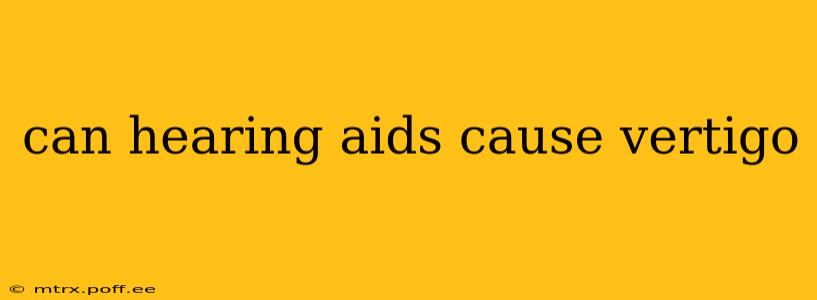Vertigo, that disconcerting sensation of spinning or dizziness, can be a debilitating condition. While hearing loss itself isn't directly linked to vertigo, the use of hearing aids, in some instances, might contribute to feelings of dizziness or imbalance. This article explores the potential connection, addressing common concerns and offering clarity on this complex issue.
What is Vertigo?
Before diving into the relationship between hearing aids and vertigo, it's crucial to understand what vertigo actually is. Vertigo isn't simply feeling lightheaded; it's a specific type of dizziness characterized by the illusion of movement, often described as a spinning sensation. This feeling can be triggered by various inner ear problems, neurological conditions, or even medication side effects.
Can Hearing Aids Directly Cause Vertigo?
The short answer is: rarely, directly. Hearing aids themselves don't typically cause vertigo. They amplify sound, aiding hearing, not impacting the inner ear's balance mechanisms directly. However, there are indirect ways hearing aids might contribute to feelings of dizziness.
How Might Hearing Aids Indirectly Contribute to Dizziness or Vertigo?
Several factors can indirectly link hearing aids to feelings of dizziness:
1. Poorly Fitted or Incorrectly Adjusted Hearing Aids:
- Pressure and discomfort: An ill-fitting hearing aid can create pressure or discomfort in the ear canal, potentially triggering a feeling of imbalance or dizziness. This is particularly true for new users who haven't fully adjusted to wearing a hearing aid.
- Occlusion effect: Some individuals experience a fullness or pressure sensation (occlusion effect) when wearing hearing aids, which can be perceived as dizziness, especially in those with pre-existing balance problems. This is more common with certain types of hearing aids and can be mitigated through proper fitting and adjustments by an audiologist.
2. Sudden Changes in Auditory Input:
- Sensory overload: For individuals who haven't worn hearing aids before, the sudden influx of amplified sounds can be overwhelming, potentially causing disorientation or dizziness. Gradually increasing the volume and adjusting to the device over time is crucial to prevent this.
- Amplification of unusual sounds: Hearing aids amplify all sounds, including those previously inaudible. If these amplified sounds are unexpected or jarring, they could trigger a feeling of unease or dizziness in sensitive individuals.
3. Underlying Medical Conditions:
- Pre-existing balance problems: Individuals already suffering from vestibular disorders (inner ear problems affecting balance) might experience an exacerbation of their symptoms when using hearing aids, but the hearing aids are not the root cause. If you have a history of vertigo or balance issues, it’s essential to discuss your concerns with your audiologist and doctor before starting hearing aid use.
- Other health issues: Certain medical conditions unrelated to hearing or balance can cause dizziness. It's vital to rule out any other potential medical causes before attributing dizziness solely to hearing aids.
4. Certain Types of Hearing Aids:
- Bone conduction hearing aids: While generally less likely to cause vertigo than other types, some individuals wearing bone conduction hearing aids may experience slight dizziness, especially initially. This is usually temporary and resolves as the user adapts.
What Should You Do if You Experience Dizziness While Wearing Hearing Aids?
If you experience dizziness while wearing hearing aids, immediately consult with your audiologist. They can check the fit of your devices, adjust settings, and help determine if the dizziness is related to the hearing aids or an underlying medical condition. In some cases, a referral to an ENT specialist or balance specialist may be necessary.
Are there any Hearing Aids that are better for individuals prone to dizziness?
There is no specific type of hearing aid guaranteed to prevent dizziness. However, discussing your concerns with an audiologist is crucial. They can help you select a hearing aid and fitting process that minimizes potential discomfort and the risk of dizziness. This might involve a gradual adjustment period, careful attention to the occlusion effect, and selecting a type of hearing aid suitable for your individual needs and sensitivities.
In conclusion, while hearing aids don't directly cause vertigo in most cases, several indirect factors can contribute to dizziness or imbalance. Proper fitting, gradual adjustment, and open communication with your audiologist are essential to mitigate any potential discomfort and ensure a comfortable and beneficial hearing aid experience. Always consult your healthcare professional if you experience persistent dizziness or vertigo.
